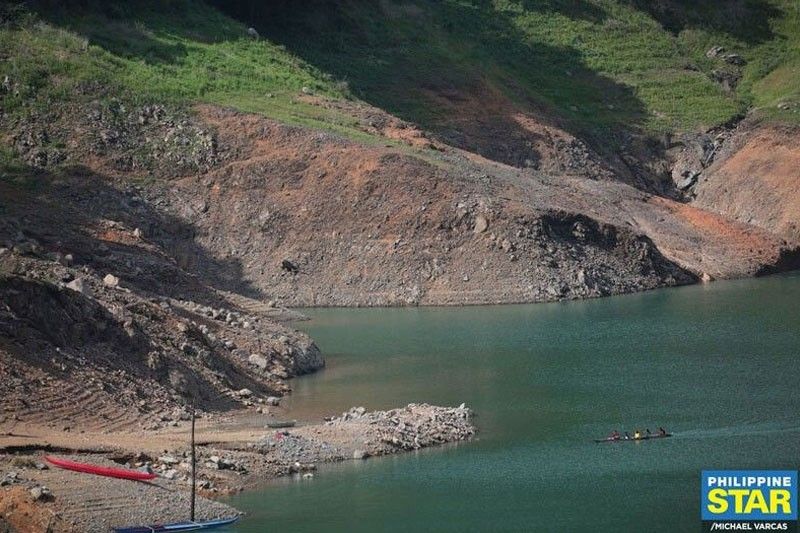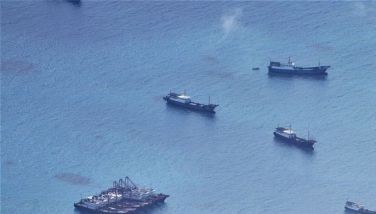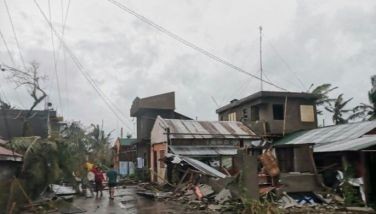Heavy rains fail to raise Angat water level

MANILA, Philippines — Heavy rainfall experienced in the past days have not been enough to improve the water level of Angat Dam, National Water Resources Board (NWRB) executive director Sevillo David Jr. said yesterday.
Data from the provincial disaster risk reduction office of Bulacan showed that the water elevation of Angat Dam had only slightly increased to 178.09 meters as of 11 a.m. yesterday, and was monitored at 177.99 meters as of 5 p.m.
David noted that the water level of Angat is still below its minimum operating level of 180 meters.
In a radio interview, David reiterated his call for the public to conserve water amid the uncertainties brought by the El Niño phenomenon.
“We continue to appeal to the need to save water. It is better for us to take advantage of the rains so that our dependence on the water from Angat Dam will be lessened,” David said.
According to David, the water from the rains can be used to support domestic needs.
At the same time, the rains will also help farmers in Bulacan and Pampanga to be able to plant after the water allocation for the irrigation decreased to 20 cubic meters per second (CMS) from the previous 28.5 CMS David said.
David said that the NWRB continues to monitor the water level of Angat Dam, adding that based on the projection of the Philippine Atmospheric, Geophysical and Astronomical Services Administration, rains will continue to come in August and September.
“We are anticipating rains for July, until August and September so that our dams will be recharged. At present, we need to prepare for the expected El Niño at the end of the year and until next year,” he said.
According to David, there is a need to manage the supply of water in the dams, particularly Angat Dam, to prevent prolonged water interruption during El Niño.
Angat dam provides the potable water needs of more than 90 percent of Metro Manila, irrigation supply to some 25,000 hectares of Bulacan and parts of Pampanga and hydropower generation needs of the Luzon grid.
Customers being serviced by Maynilad Water Services Inc. are experiencing at least nine to 11 hours daily water interruptions after the NWRB implemented the 48 CMS water allocation for the two water concessionaires.
The 48 CMS will be in effect for the entire month of July.
David said the NWRB will decide whether to adjust the 48 CMS water allocation for Maynilad and Manila Water if the water level of Angat Dam improves or further drops.
Preparations
Amid reports that many farmers have decided not to plant palay over fears of the dry spell, a ranking official of the Department of Agriculture (DA) said the government is preparing for the worst-case scenario amid the possible impact of the El Niño phenomenon.
In an interview with The STAR, Agriculture Assistant Secretary and deputy spokesman Rex Estoperez added that the DA already prepared action plans for mild, moderate and worst El Niño scenarios.
“While we do not know the extent of the effect of the El Niño, it is better to anticipate the worst so that we can prepare. All is prepared, including fisheries, agriculture crops and animals,” Estoperez added.
According to Estoperez, the DA has yet to come up with the calculations on the possible damage of the dry spell to the agriculture sector.
At the same time, Estoperez said the DA is now conducting an information campaign to assure farmers that they can still plant palay amid fears of the drought.
On the other hand, Estoperez said the Philippine Council for Agriculture and Fisheries (PCAF) submitted its recommendation to address the report of the Commission on Audit after the National Food Authority (NFA) was found to have failed to reach its target of rice procurement of 300,000 metric tons.
“The buying price of the NFA is not competitive that is why the PCAF submitted its recommendation to increase the buying price of NFA to increase their stocks,” Estoperez added. — Ramon Lazaro
- Latest
- Trending































